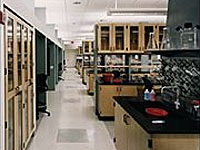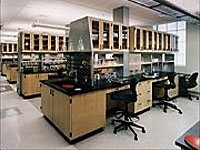Residencies and Fellowships
The Department of Pathology and Laboratory Medicine offers flexible four to five-year
training programs leading to Board certification in anatomic pathology, laboratory
medicine, or combined anatomic pathology and laboratory medicine. These programs are
individually tailored to be suitable for those individuals interested in an academic
career in pathology, in the subspecialty practice of pathology, or in the practice of
modern general pathology in the community. In addition, a training program in
experimental pathology is available for those individuals who desire a career in
scientific investigation.
The experimental pathology training program is especially suited for graduates of
combined MD/PhD programs. The core program in anatomic pathology consists of training in
pediatric and adult autopsy pathology, pediatric and adult general surgical pathology,
cytopathology, gynecologic pathology, hematopathology, neuropathology, and renal
pathology. The core training program in laboratory medicine consists of rotations in
biochemistry, coagulation, cytogenetics, hematology, microbiology, serology, transfusion
medicine, and virology. Rotations in immunopathology and molecular pathology are
included in all the training programs.
The residents are strongly encouraged to spend one year in an anatomic subspecialty or
laboratory of their choice in order to gain diagnostic expertise and/or research
experience in a specific subspecialty area of pathology. All residents are actively
encouraged to participate in the research programs of the department and to present the
results of their research at appropriate national meetings. Experimental pathology
trainees complete the core training program in either anatomic pathology or laboratory
medicine in two years and spend the subsequent two years in full-time laboratory
research. The research may be performed within the department, or with an appropriate
preceptor within other departments of Weill Medical College of Cornell Universityor
nearby Rockefeller University or Memorial Sloan-Kettering Cancer Center. These unrivaled
research opportunities combined with excellent financial support for the trainees make
the experimental pathology training program one of the most attractive in the United
States.
In addition, a fifth year of training leading to subspecialty certification is available
by application. The interests, goals and performance of each resident are reviewed
periodically the Residency Advisory Committee. This committee assists residents in
planning their advanced training years as well as in selecting specific laboratories in
which to pursue their research. The residents participate in numerous teaching
conferences concerning anatomic pathology, laboratory medicine, and clinical and basic
science research. In addition, each resident engages in student teaching in the
pathology courses of the Weill Medical College of Cornell University . All the residents
receive training and instruction from a large full-time faculty devoted to the clinical
practice of pathology, clinical and basic research and teaching.



